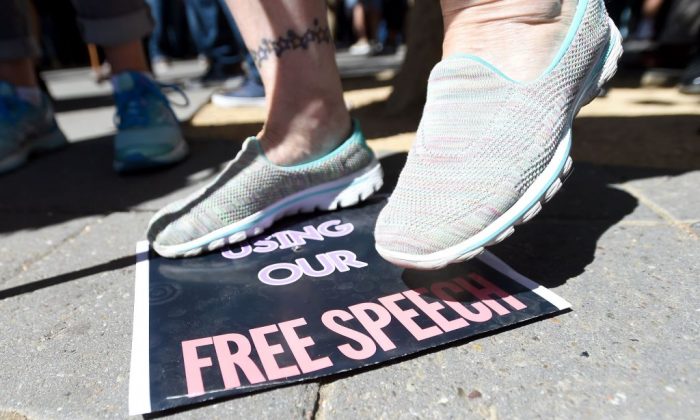After settling a lawsuit filed by a student organization, the University of Alabama in Huntsville (UAH) will terminate its on-campus speech-restricting policies, according to the Alliance Defending Freedom (ADF).
The ADF, a conservative legal group, sued the University of Alabama in 2021 on behalf of the local chapter of Young Americans for Liberty (YAL), a student group that objected to the university’s decision to limit free speech on campus.
Speech restrictions had been institutionalized for all students present on campus property, with the exception of small “speech zones” that required obtaining permission three business days in advance to speak freely.
The lawsuit (pdf) put forward by the ADF in collaboration with the Alabama Center for Law and Liberty (ACLL) claimed that the university’s policy violated both the Alabama Campus Free Speech Act and the Alabama state constitution.
ADF attorneys stated that the university’s policy illegally prevented students from engaging in spontaneous expression, and from promoting their events.
According to the ADF, student members of Young Americans for Liberty felt hindered in their desire to engage their peers in debates over gun control, federalism, and other topics, and feared repercussions for violating the university’s speech policy. “Because the permits were subject to the university’s discretionary approval, administrators could pick and choose which events and viewpoints were allowed on campus,” the ADF stated in a press release.
University officials have now settled the lawsuit with the ADF and ACLL. An agreement was reached to abolish the “speech zones” and stop requiring students to obtain a permit to speak freely on campus, although the permit can still be applied for if so desired. Provisions that granted administrators discretion to deny speaking permission on the basis of the viewpoint of the speaker will also be eliminated from the university’s policy.
“College students have the freedom to share their beliefs anywhere on campus; they don’t need permission from college officials to speak, nor should they have to jump through burdensome and illegal hoops just to talk with their classmates outside,” ADF Senior Counsel Tyson Langhofer stated.
“Alabama state law guarantees that all students at public universities can freely speak outdoors on campus grounds. We commend the University of Alabama in Huntsville for doing the right thing by amending its policy to respect students’ free speech rights,” he said.
According to free speech watchdog group Foundation for Individual Rights and Expression (FIRE), the vast majority of colleges have at least one policy in place that violates free speech. Its “Spotlight on Speech Codes” report released in December, concluded that of the 486 schools sampled, 418 universities enforce speech policies.
“We understand that actions are louder than words, and that students must be vigilant and stick to their principles against university bureaucrats,” said JP Kirby, director of Student Rights at YAL. “We will continue to use this momentum to fight for student free speech in Alabama.”
UAH did not immediately respond to NTD’s request for comment.

